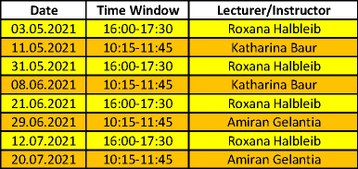Intermediate Econometrics
Update 02.03.2022:
- The review of the retake exam of the SS 2021 will take place on Friday, 29 April 2022, from 14-16pm. Prior registration on ILIAS is necessary. For further questions you may contact jasper.rennspiesdumdummymy@vwl.uni-dudummymmyfreiburg.de.
Due to the corona epidemic, the teaching of this course for the Summer Semester 2021 will be offered exclusively in digital form, i.e. the lectures and the exercise sessions will be recorded and uploaded on ILIAS. The first two videos of the lecture will be uploaded on April 19, 2021.
Students have to sign in for this course in HISinOne. The registration in ILIAS will be carried out automatically.
In ILIAS, the course can be accessed without a password until April 26, 2021, 08:59 am. Starting with April 26, 2021, 9:00 am, a password will be required in order to access the course material, the recorded videos of lectures and exercises sessions as well as the updates and relevant information in ILIAS. The password will be sent to all registered students via ILIAS on April 26, 2021 at 9:00 am.
Please note that the registration for the lecture does not automatically mean that you are registered for the exam! A separate registration for the exam is mandatory!
| Instructors |
|
| Language |
English
|
| Exercise Sessions | The exercise sessions include theoretical and computer sessions. The computer sessions are offered in exchange with the theoretical exercise sessions. |
|
Q&A Live Sessions |
Throughout the semester, we will offer Q&A Live Sessions on the dates stated below. During the Q&A Live Sessions, the students have the opportunity to ask questions regarding the material of the weeks preceding the Q&A Live Session.The Q&A Live Sessions take place in BigBlueButton (BBB). Starting with April 26, 2021, the link and the password to the BBB platform of the Q&A Live Sessions will be announced on Ilias. |
| Additional Tutorial | The additional tutorial is offered as online office hour in ILIAS via BigBlueButton on Fridays from 8 to 10 am, starting on April 30, 2021. It is intented for students who have questions about the material covered in the lecture, especially for students who did not have a proper introduction to econometrics in their Bachelor studies or who have a hard time following the lecture(r). No new material (not yet covered in lectures and exercise sessions) will be presented / discussed! |
| Credits |
|
| Work Load |
|
| Requirements |
Knowledge of mathematics and statistics as taught in the bachelor program in economics.
|
| Qualification Target |
This course aims at providing students with the basic tools in undergoing empirical research on their own. Upon successful completion of this course, students should be acquainted with the fundamentals of regression analysis and with its strengths and limitations. Moreover, they should be able to apply econometric tools and software to real economic problems and to thoroughly understand and critically interpret empirical findings.
|
| Contents |
The course covers the fundamentals of multiple linear regression analysis applied to cross sectional and time series data with emphasis on both theoretical foundations and empirical applications. The course also covers some selected topics in advanced econometrics.
The first two parts of the course involve a review of the methods taught in the statistics and econometrics courses in the Bachelor of Science in Volkswirtschaftslehre (Economics), as well as some advanced topics in regression analysis. This part is mandatory for all students. In the third part, some further advanced topics will be covered. This part is compulsory only for students writing the exam for 10 ECTS points (Master in Economics).
Besides lectures, the course entails theoretical and computer exercise sessions. While the theoretical exercise sessions aim at understanding and deepening the theoretical concepts, the computer exercise sessions aim at providing students with practical skills in undergoing empirical work by using R. The computer sessions are offered in exchange with the theoretical exercise sessions. |
| Main References | Introductory Literature
Additional Literature
VPN access is required for the eBooks. Further references will be given throughout the course. |
| Exam |
|
| Retake Exam |
|
| Grading |
100% final exam
|
| Target Group | The course is a compulsory 10 ECTS course in the first year of the Master in Economics and a compulsory 6 ECTS course in the first year of the M.Sc. VWL. It can be chosen as an elective 6 ECTS course in the M.Sc. BWL (Quantitative Methoden). |


